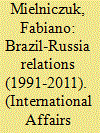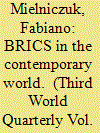|
|
|
Sort Order |
|
|
|
Items / Page
|
|
|
|
|
|
|
| Srl | Item |
| 1 |
ID:
114472


|
|
|
|
|
| Publication |
2012.
|
| Summary/Abstract |
CONSIDERING THE CONTINUITY between the Russian Empire, the Soviet Union and the Russian Federation, bilateral relations between Brazil and Russia exceed 180 years. However, a number of factors contributed for this relationship to remain incipient in most of its history - and the location of Brazil in a United States' zone of influence since its independence deserves special attention among them. In fact, the periods of lower intensity in relations with Moscow were those of greater animosity between the North American neighbor and the Soviet Union, as illustrated by the severance of diplomatic relations with the USSR in the beginning of the Cold War. In contrast, relations are restored in the context of the Independent Foreign Policy (1961) and start to intensify again in the 1970's, due to both the abandonment of the automatic alignment to the United States, adopted after the 1964 Coup, and the growing economic pragmatism of the military's foreign policy. However, even at those times the intensity of the relationship was moderate. In the late 1980's, with the end of the Cold War and the easing of tensions between the U.S. and the USSR, it could be expected a differential intensification of the relations between Brazil and Russia - the legal successor of the Soviet Union. Although there was an increase in bilateral relations since then, it is only after 2000 that the mechanisms built during the second half of the 1990's were implemented and bilateral relations reached their apogee, if compared to previous years.
|
|
|
|
|
|
|
|
|
|
|
|
|
|
|
|
| 2 |
ID:
123537


|
|
|
|
|
| Publication |
2013.
|
| Summary/Abstract |
This paper aims to address the reasons why the acronym brics is moving from being an easy marker to guide foreign investors interested in emerging markets to denoting an important political group of countries determined to promote major changes in international relations. Theoretically the paper draws on social constructivism to demonstrate that the changing identities of brics (Brazil, Russia, India, China and South Africa) can be treated as the main cause of the convergence of their interests in the international arena. Through a detailed analysis of these countries' statements at the opening sessions of the UN General Assembly from 1991 to 2011, their social claims about themselves are retraced and the way they have judged the international sphere in which they engage is captured, in order to demonstrate the changing character of their identities. These new identities, it is argued, created the opportunity for converging interests, which explains the emerging political structure of brics . The paper concludes that, after four major summits and a significant number of wide-ranging low-level meetings, brics might be considered one of the major long-lasting forces shaping the new architecture of international relations in the 21st century.
|
|
|
|
|
|
|
|
|
|
|
|
|
|
|
|
|
|
|
|
|